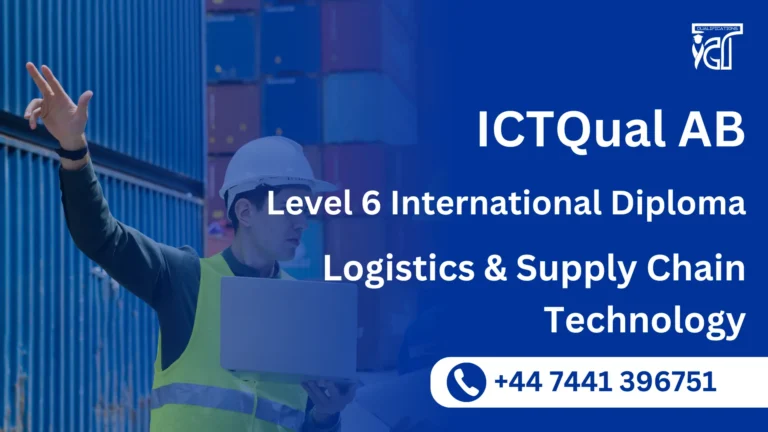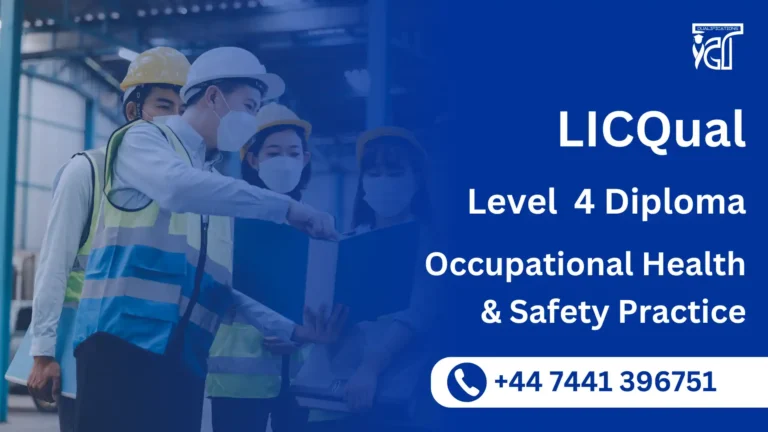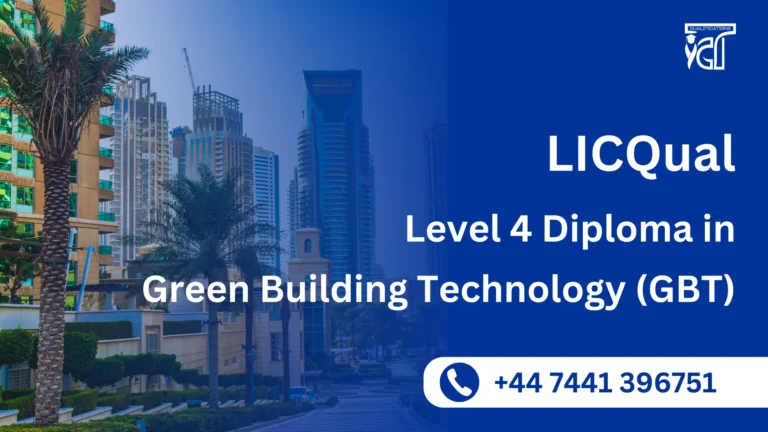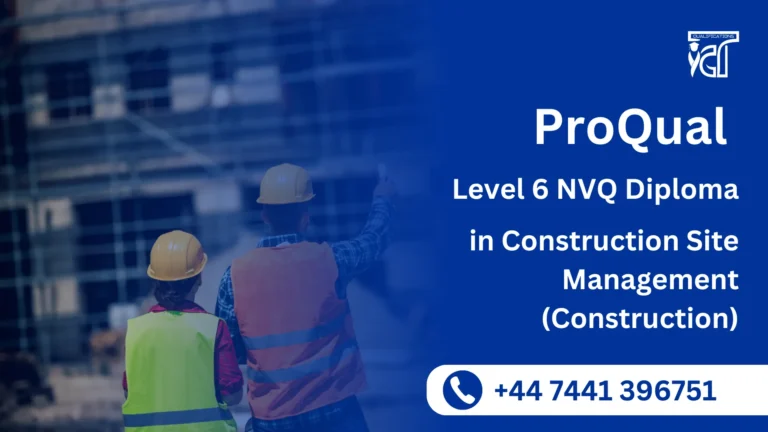The LICQual Level 6 International Diploma in Disaster Management is a high-level, internationally accredited qualification designed for senior professionals, policy-makers, and leaders involved in disaster preparedness, risk governance, emergency response, and resilience building. This advanced diploma empowers learners with the strategic expertise, analytical capabilities, and leadership skills required to design, implement, and evaluate comprehensive disaster management programmes at local, national, and international levels.
As the global landscape faces growing threats from natural hazards, technological disasters, pandemics, and the impacts of climate change, there is a critical demand for highly trained disaster management professionals. The LICQual Level 6 Diploma responds to this demand by offering a rigorous, globally focused curriculum that aligns with international frameworks such as the Sendai Framework for Disaster Risk Reduction, UN Sustainable Development Goals (SDGs), and protocols set by organizations like the United Nations Office for Disaster Risk Reduction (UNDRR), WHO, and the Red Cross Movement.
This qualification provides a multidisciplinary approach, integrating principles from emergency management, public health, environmental science, risk communication, humanitarian operations, and development planning. Learners will explore topics such as disaster governance, crisis communication, resilience policy, recovery frameworks, and ethical leadership in complex emergencies.
Ideal for professionals working in national disaster management authorities, humanitarian aid organisations, emergency response units, or international development agencies, the Level 6 Diploma prepares candidates to move into senior management, consultancy, or policy advisory roles. The programme fosters both academic and real-world competencies, enabling learners to manage high-impact disasters, lead cross-sector collaborations, and contribute to long-term sustainable resilience.
The LICQual Level 6 International Diploma in Disaster Management is not only a professional qualification—it is a leadership pathway for those ready to make a measurable difference in global disaster risk reduction and emergency response systems.
LICQual Level 6 International Diploma in Disaster Management
The Study Units of LICQual Level 6 International Diploma in Disaster Management are as :
| Unit Ref# | Unit Title | Credit | GLH |
| LICQ2200009-1 | Management of Natural Hazards | 20 | 80 |
| LICQ2200009-2 | Forecasting, Monitoring & Early warning in Disaster Management | 20 | 80 |
| LICQ2200009-3 | Research Design and Methodology in Disaster Management | 20 | 80 |
| LICQ2200009-4 | Community Innovation and Disasters | 20 | 80 |
| LICQ2200009-5 | Decision making in Disaster Management | 20 | 80 |
| LICQ2200009-6 | Crisis Management in the Twenty-First Century: “Unthinkable” Events in “Inconceivable” Contexts | 20 | 80 |
GLH (Guided Learning Hours) and TQT (Total Qualification Time) are terms commonly used in vocational qualifications to help define the amount of time a learner is expected to spend on their studies.
1. GLH (Guided Learning Hours)
GLH refers to the number of hours a learner spends being directly taught, supervised, or supported during their course. This includes the time spent in activities such as:
- Classroom instruction
- Practical workshops
- One-on-one tutoring or mentoring sessions
- Online learning sessions with tutor support
In other words, GLH represents the time that learners are actively engaged with their instructors or learning activities.
2. TQT (Total Qualification Time)
TQT represents the total amount of time a learner is expected to invest in completing a qualification, including:
- GLH (Guided Learning Hours): Time spent on direct learning, as explained above.
- Self-Directed Learning: This includes time spent on independent study, research, assignment completion, preparation for exams, and any other work the learner does outside of direct teaching hours.
TQT is a broader measure that includes all the time required to achieve the qualification. It helps learners and employers understand the overall commitment required for the qualification.
Key Differences Between GLH and TQT:
- GLH focuses on direct learning with guidance or supervision.
- TQT includes GLH as well as independent study time and other learning-related activities.
Example:
If a qualification has a TQT of 600 hours and a GLH of 250 hours, it means the learner should spend 250 hours in direct learning (classroom, online, or tutor-led sessions) and 350 hours on independent study or research.
By the end of the LICQual Level 6 International Diploma in Disaster Management, learners will be able to:
1. Management of Natural Hazards
- Understand the causes, impacts, and types of natural hazards, including earthquakes, floods, and hurricanes.
- Assess vulnerability and risks associated with natural hazards in different regions and populations.
- Develop strategies and interventions to manage and mitigate the impact of natural hazards on communities and infrastructure.
2. Forecasting, Monitoring & Early Warning in Disaster Management
- Explore advanced forecasting and monitoring systems used to predict and track disasters.
- Understand the role of early warning systems in reducing the impact of disasters on human life and property.
- Design and implement effective early warning systems tailored to different types of natural hazards and contexts.
3. Research Design and Methodology in Disaster Management
- Gain proficiency in research methodologies and data collection techniques specific to disaster management.
- Apply research design principles to develop comprehensive studies on disaster risk reduction and recovery.
- Critically evaluate research findings to inform disaster management policies and practices at local, national, and international levels.
4. Community Innovation and Disasters
- Examine the role of community-led innovations in disaster response and recovery efforts.
- Identify and evaluate successful community-based initiatives that have improved resilience and disaster preparedness.
- Design strategies to empower communities to actively participate in disaster management processes and solutions.
5. Decision Making in Disaster Management
- Develop critical decision-making skills to manage complex disaster situations effectively.
- Understand the importance of timely and informed decision-making in minimizing disaster impact and loss.
- Apply decision-making frameworks and tools to enhance coordination, resource allocation, and response efforts during a disaster.
6. Crisis Management in the Twenty-First Century: “Unthinkable” Events in “Inconceivable” Contexts
- Analyze modern crisis management strategies for handling unprecedented or rare disaster events.
- Understand how to prepare for and manage “unthinkable” events in “inconceivable” contexts, such as pandemics, global terrorism, or technological failures.
- Develop frameworks for addressing high-risk, low-probability events and the complexities of managing crises that challenge traditional disaster management models.
Key Benefits of the LICQual Level 6 International Diploma in Disaster Management:
The LICQual Level 6 International Diploma in Disaster Management offers advanced-level training designed to prepare professionals for senior leadership roles in the field of disaster risk management, humanitarian coordination, and emergency planning. This qualification equips learners with the critical tools and global frameworks needed to effectively lead disaster response efforts, influence policy, and implement resilience strategies across various sectors.
Here are the key benefits of this high-impact qualification:
1. Internationally Recognised Professional Qualification
Awarded by LICQual, a respected international awarding body, this diploma is globally accepted and highly valued by employers in government agencies, NGOs, UN organisations, emergency services, and international development agencies.
2. Advanced Disaster Leadership and Strategic Planning Skills
Learners gain high-level skills in strategic leadership, disaster governance, crisis coordination, and long-term recovery planning. The course prepares professionals to manage complex disaster operations and to lead national and international initiatives.
3. Aligned with Global Disaster Risk Reduction Frameworks
The course curriculum is aligned with globally recognised frameworks such as:
- The Sendai Framework for Disaster Risk Reduction
- UN Sustainable Development Goals (SDGs)
- WHO Health Emergencies Programme
- Red Cross/Red Crescent disaster response protocols
This global alignment ensures that learners can operate confidently in multinational disaster and humanitarian contexts.
4. Policy Development and Ethical Governance
Learners develop the ability to create and evaluate disaster management policies, contribute to legislative frameworks, and lead with ethical responsibility in disaster-prone and post-conflict environments.
5. Multidisciplinary and Cross-Sector Relevance
The diploma integrates concepts from public health, climate adaptation, humanitarian logistics, environmental science, and community development. This makes it valuable for professionals working in cross-sector roles who need a systems-level understanding of disaster management.
6. Career Advancement to Senior Positions
This qualification is ideal for professionals aiming to progress into high-level roles such as:
- Disaster Risk Reduction Consultant
- Director of Emergency Planning and Response
- Humanitarian Programme Manager
- Disaster Recovery and Resilience Advisor
- Policy Analyst or Research Specialist in DRR
The course gives learners the confidence and credentials to take on strategic roles globally.
7. Real-World Case Studies and Scenario-Based Learning
Learners engage with international case studies, emergency simulations, and field-based planning exercises that mirror real-world challenges. This practical experience enhances the ability to make informed, timely decisions under pressure.
8. Flexible Learning Pathways
The diploma is typically offered through online, hybrid, or part-time study formats, making it ideal for working professionals who need to balance their studies with other responsibilities.
9. Opportunities for Global Collaboration and Networking
Learners often study alongside professionals from diverse cultural and professional backgrounds, offering the opportunity to build global networks, share best practices, and explore international career opportunities.
10. Pathway to Postgraduate Study and Professional Certification
Upon completion, learners may progress to:
- Level 7 Diplomas in Disaster Management or related fields
- Postgraduate Degrees (e.g., MSc in Emergency Planning, Humanitarian Affairs, or Climate Resilience)
- Professional certifications in Business Continuity, Risk Management, or Crisis Leadership
Ideal Learner – LICQual Level 6 International Diploma in Disaster Management
The LICQual Level 6 International Diploma in Disaster Management is tailored for ambitious and experienced professionals who aim to take leadership, policy-making, and strategic decision-making roles in the global disaster management sector. This qualification is ideal for individuals seeking to deepen their expertise, influence national and international policies, and drive innovation in disaster risk reduction (DRR), humanitarian operations, and resilience planning.
This advanced-level diploma is suited to learners who not only have a solid foundation in emergency response or crisis management but are also ready to take a proactive leadership role in shaping the future of disaster preparedness and recovery initiatives.
Who Is the Ideal Learner for This Course?
1. Experienced Disaster and Emergency Management Professionals
Professionals already working in operational or management roles within disaster response, emergency planning, or humanitarian relief are ideal candidates. This course offers them the strategic knowledge and leadership capabilities to transition into senior or global roles.
2. Humanitarian Aid and NGO Leaders
Individuals working with international or local non-governmental organizations (NGOs), United Nations agencies, or humanitarian missions will benefit from advanced training in coordination, international law, policy frameworks, and ethical leadership.
3. Government and Civil Protection Officials
Public sector personnel involved in national disaster response agencies, civil defense, climate change adaptation, or public safety are well-suited for this course. The diploma strengthens their capacity to lead inter-agency collaboration and public policy development.
4. Military, Police, and Security Forces Personnel
Military officers, police personnel, and civil security professionals transitioning into disaster management or post-conflict recovery roles will find this diploma valuable for integrating tactical field skills with international disaster response protocols and governance.
5. Public Health and Emergency Medical Experts
Doctors, paramedics, epidemiologists, and public health planners working in disaster or epidemic response environments will benefit from understanding how to link health emergencies to broader disaster management systems.
6. Graduates of Level 5 Disaster Management or Related Programs
Individuals who have completed Level 5 Diplomas in Disaster Management, International Development, Humanitarian Studies, Environmental Science, or Public Health can use this course as the next step to develop executive-level capabilities.
7. Crisis and Risk Management Consultants
Corporate professionals, especially in sectors like energy, transportation, logistics, or infrastructure, who are responsible for business continuity, crisis planning, or emergency response strategies will gain from this comprehensive training in disaster governance and resilience building.
8. Development Planners and Climate Resilience Practitioners
Urban planners, sustainability professionals, and environmental experts who focus on building disaster-resilient infrastructure and adapting to climate change will find this diploma particularly relevant to their work.
Key Traits of the Ideal Learner:
- Professionally experienced, typically with 3+ years in a relevant field
- Strategic thinker with leadership potential or current leadership responsibilities
- Committed to humanitarian values and ethical governance
- Engaged in high-level planning, coordination, or policy implementation
- Interested in international frameworks such as the Sendai Framework, UNDRR, and SDGs
- Seeking a globally respected qualification to expand career impact and mobility
Entry Requirements
Register Now
Qualification Process
Qualification Process for the LICQual Level 6 International Diploma in Disaster Management
- Self-Assessment:
Begin by evaluating your eligibility to ensure you meet the qualification requirements, including work experience, knowledge, and language proficiency. - Registration:
Complete your registration by submitting the required documents, including a scanned copy of a valid ID, and paying the registration fee. - Induction:
An assessor will conduct an induction to confirm your eligibility for the course and explain the evidence requirements. If you do not meet the criteria, your registration will be canceled, and the fee will be refunded. - Assignmnets & Evidence Submission:
Provide all assignmnets and the necessary evidence based on the assessment criteria outlined in the course. If you are unsure of the required evidence, consult with the assessor for guidance on the type and nature of evidence needed. - Feedback and Revision:
The assessor will review your submitted evidence and provide feedback. Evidence that meets the criteria will be marked as “Criteria Met,” while any gaps will be identified. You will be asked to revise and resubmit if needed. - Competence Evidence:
Submit final evidence demonstrating that all learning outcomes have been met. This evidence will be marked as “Criteria Met” by the assessor once it is satisfactory. - Internal Quality Assurance (IQA):
The Internal Quality Assurance Verifier (IQA) will review your evidence to ensure consistency, quality, and compliance with standards. - External Verification:
The IQA will submit your portfolio to LICQual External Quality Assurance Verifiers (EQA) for final confirmation. The EQA may contact you directly to verify the authenticity of your evidence. - Certification:
Upon successful completion of all checks, LICQual will issue your official certificate, confirming that you have attained the LICQual Level 6 International Diploma in Disaster Management.







